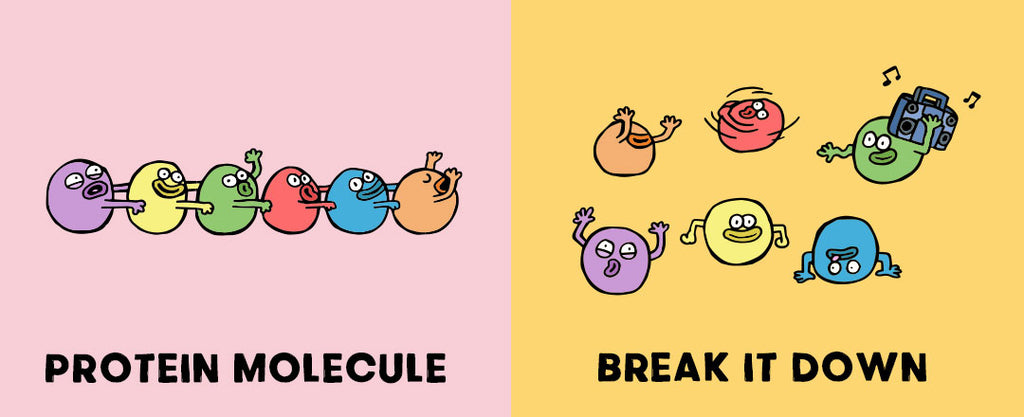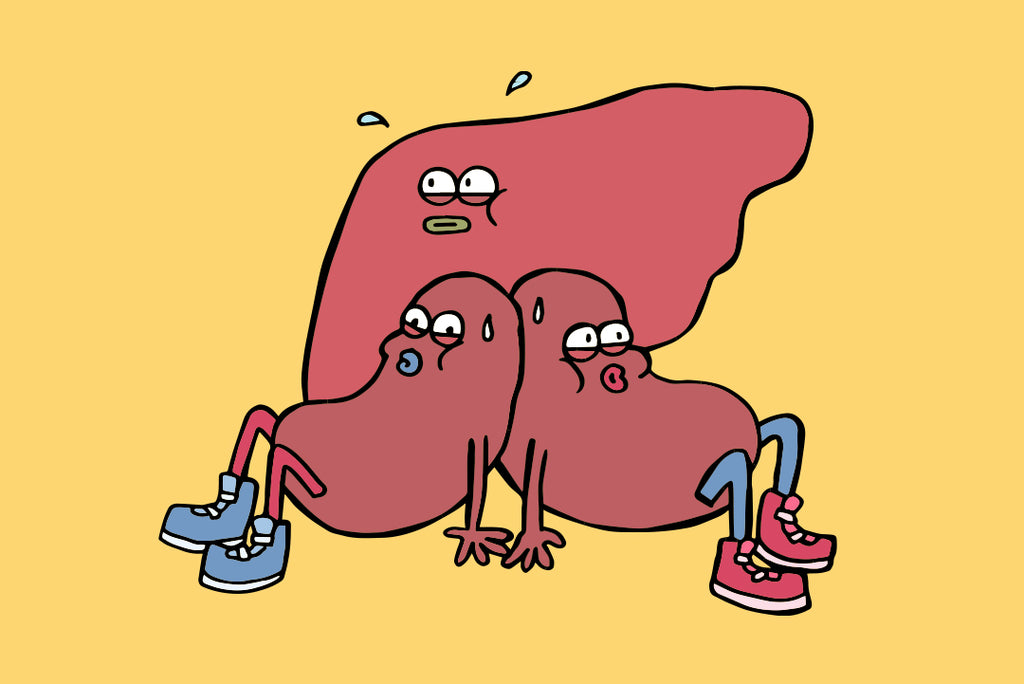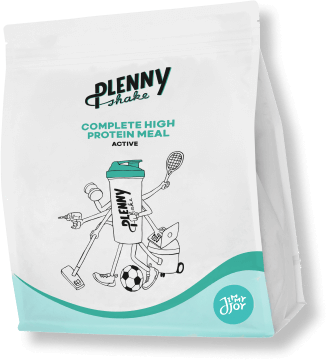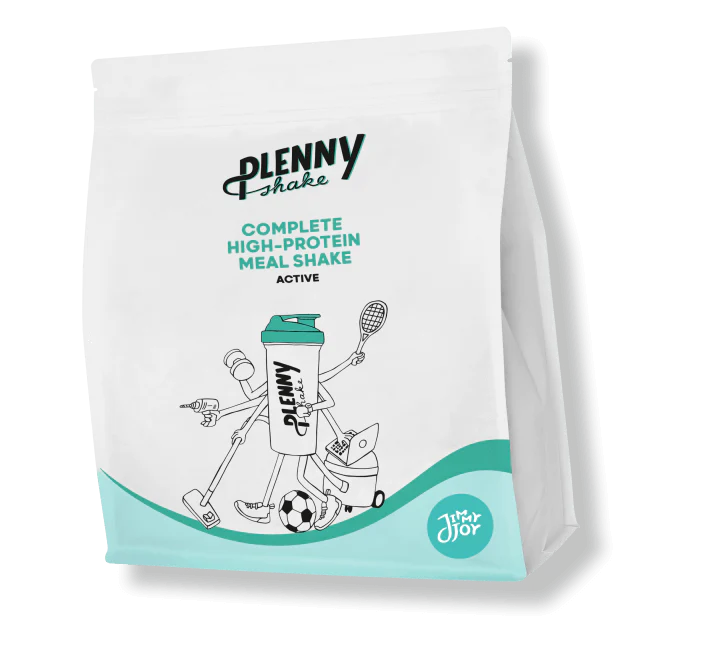We all know that you shouldn’t give a hamster the same amount of protein as an elephant -apart from that the hamster could probably never fit in his tiny coconut home anymore- it’s definitely unhealthy too. That’s why you may not be surprised that more or less the same counts for human protein intake. Yet, for most of us it’s still unclear how much protein we ACTUALLY need.

In this article we will tell you more about:
- The importance of protein.
- The amount that is necessary for overall good health.
- Good protein sources.
- What happens if you overdo protein.
- How you could maybe benefit from more protein.
1. The importance of protein
Protein is essential to good health. It’s so important that it’s even visible in the name. Protein comes from the Greek protos, meaning “first” — this reflects protein’s top-shelf status in human nutrition [1]. Protein is a macronutrient, together with fat and carbohydrates. This means that you need relatively large amounts of it in your diet for growth, energy and health. Protein is different from the other macronutrients because the body does not store protein, and therefore has no reservoir to draw on when it needs a new supply. However, this doesn’t mean that the solution is to eat protein all day long, because once the protein needs are met, any extra is used for energy or stored as fat [2].
Generally, protein can be found in every cell of our body and is needed to put meat on our bones, build and repair tissues and to make hair, blood, antibodies, enzymes, and more. Also, your nails - that come in handy when peeling off those annoying stickers on apples - are mostly made out of protein [3]. If you want to know more about protein, read our article: introduction to macronutrients.

2. So, the more protein the better?!
No, not really. Our body is continuously breaking down, repairing and rebuilding its own tissue. In periods of sickness or increased physical activity more protein is needed for recovery. But if you would describe yourself as a “Netflix-Binging-Couch-Potato” on your online dating profiles, the advised daily protein intake for your body weight will probably be enough.
How much is necessary?
The Recommended Dietary Allowance (RDA) for protein is 0.8 grams of protein per kilogram of body weight. This is the amount of a nutrient you need to meet your basic nutritional requirements. Meaning, it’s the minimum amount you need to not get sick — not the specific amount you are supposed to eat every day [1]. To discover your daily protein intake, you could use this online protein calculator. According to a 2019 study that compared the satiating effect of two protein diets on resistance-trained individuals during short-term energy deficit 1.8 g/kg/d is a good target protein intake for many people for maximum satiety [4,5].

Nowadays, most public health organizations have shifted their focus from concentrating on specific amounts of daily protein, fats and carbohydrates to the importance of eating healthier protein rich foods. What’s key to mention is that “more protein” also doesn’t necessarily mean “eat more meat or dairy products” [1]. These products do provide high quality protein, but plants do too! Think about soy, whole grains, legumes and vegetables. The added advantage of these plants is that they are less resource-intensive a.k.a a more sustainable protein alternative. For example, did you know that 91% of deforestation is caused by lifestock?! Not ok [6]. So before you start to step up your protein intake game with meat, consider these humble beans instead!
Also, before ramping up on protein it’s important to keep the so-called protein “package” in mind: the fats, carbohydrates, vitamins, minerals, and other nutrients that always come along with protein. Dietitian Kathy McManus, director of the Department of Nutrition at Harvard-affiliated Brigham says, “It’s important to aim for protein sources that are rich in many nutrients but low in saturated fat”.
What happens if you eat too much protein?
It is possible to eat too much protein, but the exact numbers for actual harm remain unclear and it likely varies between people. At the end of the day there hasn’t been any clear evidence that eating too much protein can cause harm in healthy people. There’s been a 2016 study that investigated the effect of a high protein diet over a one-year period in healthy, strength-training men. This study showed that eating around 1.4 grams per pound of body weight (3 grams per kg) every day for a year didn’t have any adverse health effects [8]. Another study found that even consuming 5.5 times the recommended daily allowance of protein had no effect on body composition in healthy individuals [9].

However, some researchers do suggest that too much protein can be harmful for people, especially to people suffering from kidney diseases. There have been some indications that extra protein makes the kidneys work harder, as a consequence it may increase the risk of kidney stones [8,11].
When extra protein is not used efficiently by the body it may impose a metabolic burden on the bones, kidneys and liver. According to this study it therefore could also cause nausea, cramps, headaches, fatigue and bloating in healthy people [12]. Yet, further investigation with large randomized controlled studies is needed to draw definite conclusions.
3. Can I benefit from more protein?
The first questions you’ll need to ask yourself are: Am I an extreme athlete? Am I recovering from an injury or surgery? Or am I 60 years or older? Are the answers to all these questions ‘no’? Well then you probably don’t need extra protein. Did you answer ‘yes’ to some of the questions? Continue reading!
Athletes
If you are for example in an anabolic state or building muscle, such as if you're an endurance athlete who’s training for a marathon 6 days a week, some extra protein can give you that little bit extra to repair and rebuild muscles. Extreme athletes use protein primarily to repair and rebuild muscle that is broken down during exercise. Protein also helps optimizing carbohydrate storage in the form of glycogen. It can give athletes the edge they need to for faster recovery [13].
If you're moderately exercising for 150 minutes a week, as the Centers for Disease Control and Prevention recommends - or just don’t exercise (we won’t judge, out loud, anyway) - you're probably not an extreme athlete [14].
Older people and individuals recovering from an injury
From the age around 60 muscles really start to break down, according to Kathryn Starr, aging researcher at Duke University School of Medicine. “As we get older the body's ability to break down protein is also lowered, that’s why protein needs of older people actually increase [15,16].” During a surgical procedure or in case of an injury your muscles are potentially damaged or manipulated. These muscles need to get repaired by the body again. In this case your body may benefit from some extra protein, because the amino acids in protein repair muscle damage by regenerating tissue and speeding up wound healing [17].
4. What are good protein sources?
Still in the game for stepping up your protein intake? According to USDA National Nutrition Database the following foods are good plant-based protein sources [18].
Food product |
Protein amount per 100g |
|
Baked beans, boiled |
6g |
|
Lentils, boiled |
9g |
|
Oats |
14g |
|
Flaxseeds |
18g |
|
Nuts |
20g |
|
Soybeans or soy products (beans, tofu, tempeh) |
36g |
|
Hemp seeds |
33,2g |
|
Spirulina (algae) |
57g |
5. Protein and Jimmy joy
Protein? Jimmy Joy’s got you covered. All our products contain 20 grams of protein all nine of the essential amino acids your body needs, making sure your body is supplied with the recommended daily intake set by the World Health Organization, the European Food Safety Authority.
The Plenny Shake Active has 27 gram of plant based protein per 400 kcal meal!
Our products contain different protein sources: soy, flaxseed, hemp and oats. Soy on its own would already provide more than enough protein but we also added some other cool ingredients to increase the diversity of our nutrient profile. Also, the protein in our products help to lower the glycemic index of the shake, which lowers the impact of a sugar crash. So, no need for daytime naps anymore, you’re welcome!
In conclusion, if you think you need more protein in your diet, consider the questions stated in the third paragraph. For most people, there’s no reason to worry about the amount of protein in your diet. If you follow a well-balanced and varied diet your protein intake should be in a safe and healthy range [19].
Sources:
1. D. Pendick (2015). How much do you really need? From: https://www.health.harvard.edu/blog/how-much-protein-do-you-need-every-day-201506188096
2. K. Wempen (2017). Are you getting to much? From: https://newsnetwork.mayoclinic.org/discussion/are-you-getting-too-much-protein/
3. M. Lonnie (2018). Protein for Life: Review of Optimal Protein Intake, Sustainable Dietary Sources and the Effect on Appetite in Ageing Adults. From: https://www.ncbi.nlm.nih.gov/pmc/articles/PMC5872778/
4. J. Roberts (2019). Satiating Effect of High Protein Diets on Resistance-Trained Individuals in Energy Deficit. From: https://www.mdpi.com/2072-6643/11/1/56/htm
5. M. Helselmans (2019). How much protein do you need for maximum satiety? From: https://mennohenselmans.com/protein-satiety-study/
6. S. Margulis. (2003). Causes of Deforestation of the Brazilian Amazon. From: https://openknowledge.worldbank.org/bitstream/handle/10986/15060/277150PAPER0wbwp0no1022.pdf?sequence=1
7. K McManus (2015) How much do you really need? From: https://www.health.harvard.edu/blog/how-much-protein-do-you-need-every-day-201506188096
8. J. Antonio (2016). A High Protein Diet Has No Harmful Effects: A One-Year Crossover Study in Resistance-Trained Males. From: https://pubmed.ncbi.nlm.nih.gov/27807480/
9. C. Peacock (2014) The effects of consuming a high protein diet (4.4 g/kg/d) on body composition in resistance-trained individuals. From: https://pubmed.ncbi.nlm.nih.gov/24834017/
10. A. Pipitone (2018). How Much Protein Do You Really Need? From: https://www.npr.org/sections/thesalt/2018/12/03/669808699/how-much-protein-do-you-really-need?t=1593420997897&t=1595233339580
11. A. Levey (1996). Effects of dietary protein restriction on the progression of advanced renal disease in the Modification of Diet in Renal Disease Study. From: https://pubmed.ncbi.nlm.nih.gov/8629624/
12. I. Delimaris (2013). Adverse Effects Associated with Protein Intake above the Recommended Dietary Allowance for Adults. From: https://www.ncbi.nlm.nih.gov/pmc/articles/PMC4045293/
13. S. Philips (2011). Dietary protein for athletes: from requirements to optimum adaptation. From: https://pubmed.ncbi.nlm.nih.gov/22150425/
14. Centers for Disease Control and Prevention (2020). How much physical activity do older adults need? From: https://www.cdc.gov/physicalactivity/basics/older_adults/index.htm
15. R. Elango (2010) Evidence that protein requirements have been significantly underestimated. From: https://pubmed.ncbi.nlm.nih.gov/19841581/
16. J. Baum (2016). Protein Consumption and the Elderly: What Is the Optimal Level of Intake? From: https://pubmed.ncbi.nlm.nih.gov/27338461/
17. K. Tipton (2015). Nutritional Support for Exercise-Induced Injuries. From: https://www.ncbi.nlm.nih.gov/pmc/articles/PMC4672013/
18. USDA (2020). Vegetariens. From: https://www.choosemyplate.gov/node/5635
19. R. Wolfe (2017). Optimizing Protein Intake in Adults: Interpretation and Application of the Recommended Dietary Allowance Compared with the Acceptable Macronutrient Distribution Range. From: https://academic.oup.com/advances/article/8/2/266/4558082
 Everything You Need In One Meal
Everything You Need In One Meal
 Stay Full For 3-5 Hours
Stay Full For 3-5 Hours













 Product added to cart
Product added to cart





